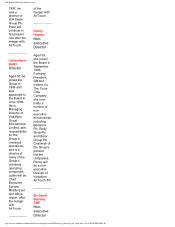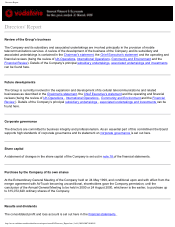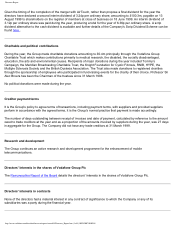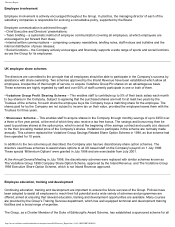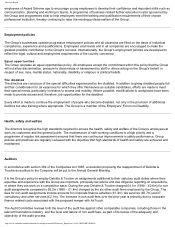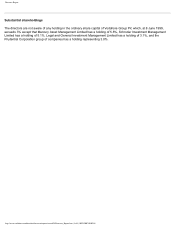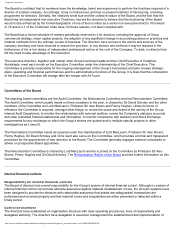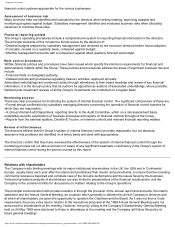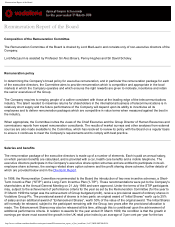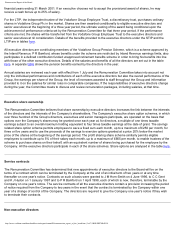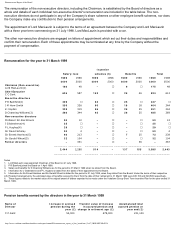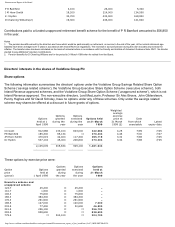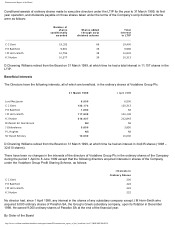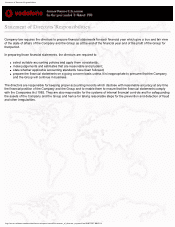Vodafone 1999 Annual Report Download - page 37
Download and view the complete annual report
Please find page 37 of the 1999 Vodafone annual report below. You can navigate through the pages in the report by either clicking on the pages listed below, or by using the keyword search tool below to find specific information within the annual report.
Corporate Governance
The Board is confident that its members have the knowledge, talent and experience to perform the functions required of a
director of a listed company. Accordingly, it has not introduced, and has no present intention of introducing, a training
programme for directors. Similarly, the relatively small size and the cohesive nature of the Board, and the fact that the
Board has an independent non-executive Chairman, has led the directors to believe that the functioning of the Board
would not be enhanced by the formal designation of one of their number as a senior non-executive director. Provisions
A.1.6 and A.2.1 of the Combined Code have, for these reasons, not been complied with.
The Board has a formal schedule of matters specifically reserved to it for decision, including the approval of Group
commercial strategy, major capital projects, the adoption of any significant change in accounting policies or practices and
material contracts not in the ordinary course of business. The directors have access to the advice and services of the
company secretary and have resolved to ensure the provision, to any director who believes it may be required in the
furtherance of his or her duties, of independent professional advice at the cost of the Company. To date, no director has
felt the need to take advantage of this resolution.
The executive directors, together with certain other Group functional heads and the Chief Executive of Vodafone
Australasia, meet each month as the Executive Committee under the chairmanship of the Chief Executive. This
Committee is primarily responsible for the ongoing management of the Group’s businesses and also reviews strategic
plans, operating and financial performances and the administrative functions of the Group. It is likely that the composition
of the Executive Committee will change after the merger with AirTouch.
Committees of the Board
The standing board committees are the Audit Committee, the Nominations Committee and the Remuneration Committee.
The Audit Committee, which usually meets on three occasions in the year, is chaired by Sir David Scholey and the other
members of the Committee are Lord MacLaurin, Professor Sir Alec Broers and Penny Hughes. Under its terms of
reference the Committee is required, amongst other things, to review the scope and extent of the activity of the Group
Internal Audit Department, to monitor the relationships with external auditors, review the Company’s statutory accounts
and other published financial statements and information, to monitor compliance with statutory and Stock Exchange
requirements for any exchange on which the Group’s shares are quoted and to institute special projects or other
investigations as it sees fit.
The Nominations Committee meets as required under the chairmanship of Lord MacLaurin. Professor Sir Alec Broers,
Penny Hughes, Sir David Scholey and Chris Gent also serve on this Committee, which provides a formal and transparent
procedure for the appointment of new directors to the Board. The Committee generally engages external consultants to
advise on prospective Board appointees.
The Remuneration Committee is chaired by Lord MacLaurin and he is joined on the Committee by Professor Sir Alec
Broers, Penny Hughes and Sir David Scholey. The Remuneration Report of the Board provides further information on this
Committee.
Internal financial controls
Responsibility for internal financial controls
The Board of directors has overall responsibility for the Group’s system of internal financial control. Although no system of
internal financial control can provide absolute assurance against material misstatement or loss, the Group’s systems have
been designed to provide the directors with reasonable assurance that assets are safeguarded, transactions are
authorised and recorded properly and that material errors and irregularities are either prevented or detected within a
timely period.
Control environment
The directors have established an organisation structure with clear operating procedures, lines of responsibility and
delegated authority. The directors have delegated to executive management the establishment and implementation of
http://www.vodafone.com/download/investor/reports/annual99/corporate_governance.htm (2 of 4)30/03/2007 00:09:10



